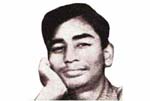 Yesterday marked the 53rd death anniversary of legendary poet Sukanta Bhattacharya. He was born in 1926 in Kalighat, Kolkata. His ancestral home is at the village Unshiya, under Gopalganj district now, in Bangladesh. His father, Nibaran Bhattacharya, was in the book selling business in Kolkata.
Yesterday marked the 53rd death anniversary of legendary poet Sukanta Bhattacharya. He was born in 1926 in Kalighat, Kolkata. His ancestral home is at the village Unshiya, under Gopalganj district now, in Bangladesh. His father, Nibaran Bhattacharya, was in the book selling business in Kolkata.
Sukanta was one of the key figures of modern Bengali poetry, despite the fact that most of his literary works had been in publication posthumously. During his life, his poems were not widely circulated, but after his death his reputation grew to the extent that he became one of the most popular Bengali poets of the 20th century.
The poetry of Sukanta is characterised by rebel socialist thoughts, patriotism, humanism and yet romanticism.
Sukanta spent his childhood at their house on Nibedita Lane in Kolkata. He was sent to Kamala Bidyamandir, a local primary school where his literary career began. His first short story was published in Sanchay, the school’s student magazine. Later another of his prose writing, “Vivekanander Jiboni”, was published in Sikha, edited by Bijon Bhattacharya.
After studying at Kamala Bidyamandir, he got admitted to Beleghata Deshbandhu High School. He joined the Communist Party of India in 1944. In the same year, he edited an anthology, named “Akal”, published by the Anti-Fascist Writers’ and Artists’ Association. In 1945, he appeared in the entrance examination from Beleghata Deshbandhu High School but failed. He was the editor of the Kishore Sabha, the Bengali daily organ of the party, Dainik Swadhinata, from its inception in 1946. He died of tuberculosis at the Jadavpur T.B. Hospital in Kolkata in 1947 at a very young age of 20.
His notable literary works are “Chharpatra”, “Ghum Nei”, “Purbabhas”, “Abhijan”, “Mithe-Kadha” and “Geeti Guccha”.
-With The Daily Star input




















